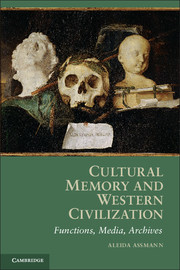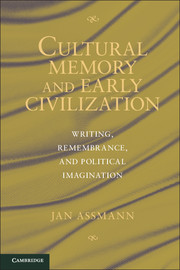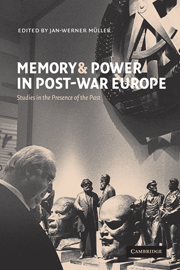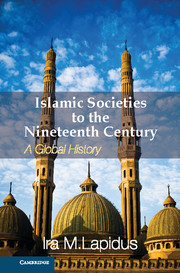Cultural Memory and Western Civilization
Cultures invest great efforts into creating a long-term memory on the basis of oral transmission, media technology and institutional frameworks. This book provides an introduction to the concept of cultural memory, focusing on the 'arts' of its construction, particularly various media such as writing, images, bodily practices, places and monuments. Examining the period from the European Renaissance to the present, Aleida Assmann reveals the close association between cultural memory and the arts, arguing that the artists who have supplemented, criticized, transformed and opposed it are its most lucid theorists and acute observers. Her analysis also addresses the interaction of cultural memory with individual memory and the ways in which cultural memory supports or subverts social and political identity constructions. Ultimately, this book offers a comprehensive overview of the history, forms and functions of cultural memory, which has become a central analytical tool for scholars across disciplines.
- Provides an introduction to the concept of cultural memory
- Makes available for the first time in English a key text in the field of cultural memory
- Truly interdisciplinary work that should be of interest to historians, literary scholars and philosophers
Reviews & endorsements
'Aleida Assmann brings startling originality, brilliant explanation, and conceptual rigor to the difficult and sprawling terrain of memory. This is a classic, pathbreaking work to which readers will remain long indebted.' Peter Fritzsche, University of Illinois
'This is a pathbreaking study of a category that now is commonplace in both undergraduate and graduate studies in the humanities and social sciences. Until now, there has been nothing like it available in English. It is essential reading to understand why memory has displaced class, race, and gender as the signature category of our generation.' Jay Winter, Yale University
'An unsurpassed starting point for the understanding of the human as, in Nietzsche's words, an animal who remembers.' The Times Literary Supplement
Product details
November 2011Paperback
9780521165877
424 pages
228 × 152 × 12 mm
0.57kg
14 b/w illus.
Available
Table of Contents
- Introduction
- Part I. Functions:
- 1. Memory as ars and vis
- 2. THE sECULARIZATION oF mEMORY - MEMORIA, FAMA, HISTORIA
- 3. The battle of memories in Shakespeare's histories
- 4. Wordsworth and the wound of time
- 5. Memory boxes
- 6. Function and storage: two modes of memory
- Part II. Media:
- 7. Metaphors, models, and media of memory
- 8. Writing
- 9. Image
- 10. Body
- 11. Places
- Part III. Storage:
- 12. Archives
- 13. Permanence, decay, residue - problems of conversation and the ecology of culture
- 14. Memory simulations in the wasteland of forgetfulness - installations by modern artists
- 15. Memory as 'leidschatz'
- 16. Beyond the archive
- 17. Conclusion: the arts of memory.








.jpg)
.jpg)